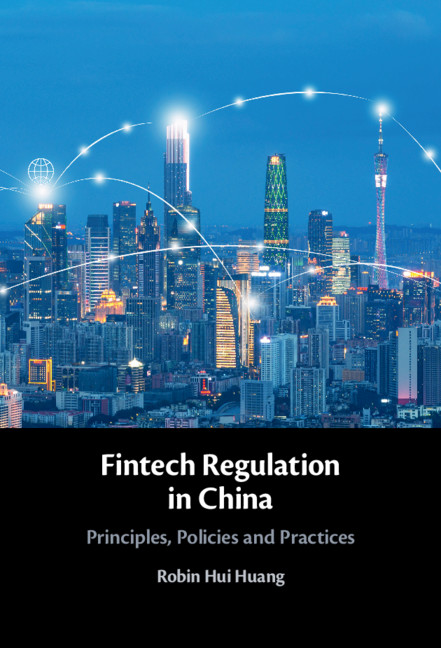A new book by Robin Hui Huang

Financial technology (Fintech) brings about paradigm changes to the traditional financial system, presenting both challenges and opportunities. In 2020 when this book was largely written, unlike many traditional businesses, Fintech seemed to be accelerated rather than hampered by the outbreak of the COVID-19 pandemic. Due to the various restrictions and even lockdowns imposed during the pandemic, more people and institutions have embraced Fintech, doing shopping, payment, and investment through online platforms. In any event, Fintech looks set to reshape the financial landscape, producing significant impact on the business community and society at large.
This is the first book-length treatment of the regulation of Fintech in China. At the international level, there has been a fierce competition for the coveted title of global Fintech hub. One of the key enablers of success in this race is regulation. As the world’s leader in Fintech, China’s regulatory experience is of both academic and practical significance. This book aims to present a systematic and contextualized account of China’s Fintech regulation, identify relevant institutional factors contributing to the development of the Chinese law, and illustrate why and how China’s Fintech regulation has been developed, if and how it differs from the rest of the world, and what can be learned from the Chinese experience.
Fintech is an evolving concept with new products or services emerging constantly. Hence, it seems neither desirable nor feasible to discuss all Fintech sectors in this book, and it would be necessary to be selective about the topics to be covered. This book chooses to focus on the following topics: online P2P lending, cryptoassets, initial coin offerings, mobile payments, data protection, robo-advisory, equity crowdfunding and central bank digital currency. In fact, China has both stories of success (e.g., mobile payments) and lessons of failure (e.g., online P2P lending).

Although different sectors of the Fintech market have different features and issues, this book shows some common threads running through them. First and foremost, the regulatory goal is to achieve two main objectives, namely facilitating financial innovation and market development on the one hand, while ensuring risk control and investor protection on the other. Second, the regulatory balance is a delicate and dynamic one, which needs to be carefully designed and adjusted according to the local conditions of any given jurisdiction. Third, the regulatory regime for the Fintech markets is a work-in-progress, which is not surprising given the fast-changing pace of the underlying Fintech markets.
Given the novel and disruptive nature of Fintech, a fundamental question here is whether we can still use the traditional regulatory framework for Fintech, or we need to think outside the box and introduce a new one specifically for Fintech? Indeed, Fintech regulation presents a cutting-edge and largely uncharted territory, and the right key can be found only after lots of trial and error.
From a political-economic perspective, this book also ventures to demonstrate the Chinese characteristics of China’s Fintech regulation. For instance, it does not only examine the substantive rules, but also the enforcement issues, particularly the interest group politics of relevant regulators. At a higher level, China’s Fintech market can be labelled “policy market” in that the development and regulation of China’s Fintech markets have been heavily influenced by the policies of the government (or even the Chinese Communist Party). Data privacy and cybersecurity have become increasingly important in the regulation of China’s Fintech business, with far-reaching implications for the financial markets domestically and internationally (via overseas-listed Chinese Fintech firms). There can be more uncertainty arising from these issues due to China’s growing concerns over national security against the background of the ongoing competition (confrontation) between China and the US.
In sum, the Chinese experience can have important implications for the international discourse and debate on the regulation of Fintech. This book has several features which readers may find useful as a source of information. Firstly, a systematic and contextualized account of China’s Fintech regulation helps readers gain a holistic view of the regulatory approach and regulatory perimeter in China. Secondly, the book tries to identify and analyze factors the interaction of which has contributed to the constitution of the institutional environment in which China’s regulation of Fintech has been made and enforced. This will help readers understand not only what the law is, but also why the law is the way that it is. Thirdly, it takes a comparative approach to critically evaluate Fintech regulation in China. The comparative analysis covers some major Fintech jurisdictions in the region and internationally, such as the US, the UK, Singapore and Hong Kong.
Robin Hui Huang’s book, Fintech Regulation in China: Principles, Policies and Practices was published with Cambridge University Press and is available here.
Robin Hui Huang is Professor (senior level) at the Faculty of Law, Chinese University of Hong Kong. He is a leading expert in corporate and financial law with a focus on Chinese and comparative issues. He is also Adjunct Professor of Law at the University of New South Wales, Li Ka Shing Visiting Professor of Law at McGill University, Honorary Professor at East China University of Political Science and Law, and Guest Professor at China University of Political Science and Law. He is Specially-Invited Research Fellow of the Supreme People’s Court of PRC and Expert Advisor of Shanghai Financial Court. He has had about 120 publications, including 10 books and many papers in premier publishing houses and top journals in the United States, United Kingdom, Australia, Canada, Germany, Israel, Hong Kong, Mainland China, and elsewhere. He acts as a Chinese law expert in international litigations and serves as an arbitrator in China and overseas.
